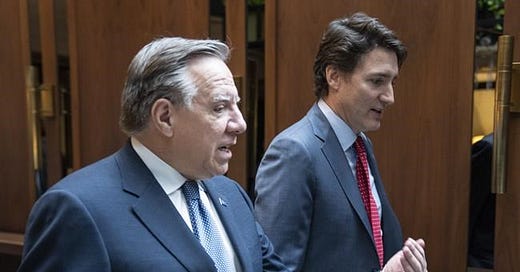Ottawa's negligence has emboldened Quebec's sovereigntist cause
With the Parti Quebecois gaining traction in recent public opinion polls, any increased support for Quebec independence is a result of Trudeau's complicity in Legault's nation-building project.
Following the recent passage of a unanimous motion in Quebec's National Assembly affirming the financial viability of an independent Quebec, one wonders how many more signals Justin Trudeau’s Liberal government would need to see, in order to take seriously the developments emanating from the province’s ongoing nation-building project.
While it may be tempting to dismiss these types of political tactics as idle threats, it would be far more prudent to interpret what is happening in Quebec as instructive to where things may be headed for the future of our federation.
As previously documented in this newsletter, Quebec Premier Francois Legault has continued to govern with a sovereigntist bent, in the name of protecting the French language and culture within the province - and in doing so, has slowly been manifesting conditions that will ensure any future referendum on independence would merely formalize what has already become a new iteration of Rene Levesque’s conception of “Sovereignty-Association.”
Take for instance his government's latest salvo: the doubling of tuition rates for out-of-province, non-francophone students to attend Quebec universities, which namely would disproportionately impact its three anglophone institutions; McGill, Concordia, and Bishop's University.
McGill University’s President and Vice-Chancellor, Deep Saini, has already shared the dire consequences of such an initiative, indicating a precipitous impact on enrollment rates, job cuts, and roughly an estimated $94 million in losses. Concordia is echoing similarly “devastating financial implications.”
In the supposed pursuit of protecting the French language, Legault has been vigorously attacking any and all remnants of English institutions within the province. The most egregious act to date has been Quebec's Bill 96, which astoundingly purports to unilaterally amend the Canadian Constitution to declare Quebec’s nationhood, with French being its only official language, while serving to limit anglophone minority rights in other aspects.
Unsurprisingly, Legault's tuition maneuver has drawn comparisons to what Levesque did as Premier to limit access to English schools with his Bill 101, compelling all students up to the age of 16 to attend mandatory French schools. It is hard to shake the impression that Legault is channeling similar measures that were intended to orchestrate Quebec’s eventual separation from the rest of Canada, despite his previous statements claiming a referendum on the matter is not a priority.
All this to say, the seeming fallout from Legault’s nation-building endeavour can now be seen in the revitalization of the Parti Quebecois’ (PQ) raison d’etre, as evidenced not only by the PQ’s recent by-election victory in the riding of Jean-Talon, but even more so with its unabashed pronouncements on pursuing outright independence should the PQ form the next government.
Incidentally, the doubling of tuition fees for out-of-province students has been seen as a direct response to the PQ's stunning by-election win. But what this ends up creating is a troubling dynamic, whereby Legault’s governance has lent credence to the notion of sovereignty, and with the corresponding rise in popular support for the PQ as a result, this in turn intensifies Legault's efforts to salvage any lost electoral support to the PQ. In other words, a vicious cycle.
And though it would be obvious to hold the Legault government responsible for resurrecting the PQ’s relevance, in actuality, the real culpability rests with the tepidness of our federal government.
Where has Justin Trudeau and his Liberal government been to decry the difficulties now imposed on students from other provinces having to endure punitive fees to study in Quebec? Like many other similar measures throughout Legault's tenure, Trudeau has mostly responded with tacit acceptance or utter indifference, all of which is unbecoming for someone who should be speaking up for the interests of Canada, and not simply for his own narrow self-interest at the cost of national unity.
For example, this newsletter has long called for a judicial reference question to the Supreme Court on the unconstitutionality of Bill 96, yet Trudeau has dangerously given Quebec a free pass, stating the province had every right to do so, even though it glaringly contradicts the constitutional wrangling over such matters decades ago. Challenging this law would have sent a warning signal about Ottawa's readiness to preserve the constitutional order. Instead, Trudeau's passivity has produced a counter-signal.
By not showing any federal strength, it has only emboldened more daring actions from Legault in steering a course further away from any previous understanding of federalism, which is now being seized on by PQ leader Paul St-Pierre Plamondon, when he asserts, “I note above it all the federalist argumentation has never been weaker.”
Much of what is transpiring in Quebec has been attributable to Trudeau's fear of political retaliation from Legault, who until recently, remained a popular figure in Quebec, and so Trudeau has opted for passive affirmation of Legault’s overall governance, as a means of pandering for sustained electoral support in his home province, rather than attempting to restore constitutionality in this country.
If further evidence was needed to underscore the lengths to which this Prime Minister would go in serving his electoral aims above all else, his recent decision to undercut his own signature environmental policy by exempting home heating oil, used predominantly by Atlantic Canadians, from the national carbon tax because of sagging poll numbers in the region, is the epitome of crass political pandering.
It is worth reflecting on another of St-Pierre Plamondon’s remarks about Quebec independence, when he also suggested “We have a rendezvous with history ahead of us.” It was in this history, that Pierre Elliott Trudeau successfully thwarted Levesque's attempt at seceding from the federation during the 1980 Quebec Referendum. Under the current Trudeau, however, it is clear all bets would be off in the aforementioned rendezvous.




